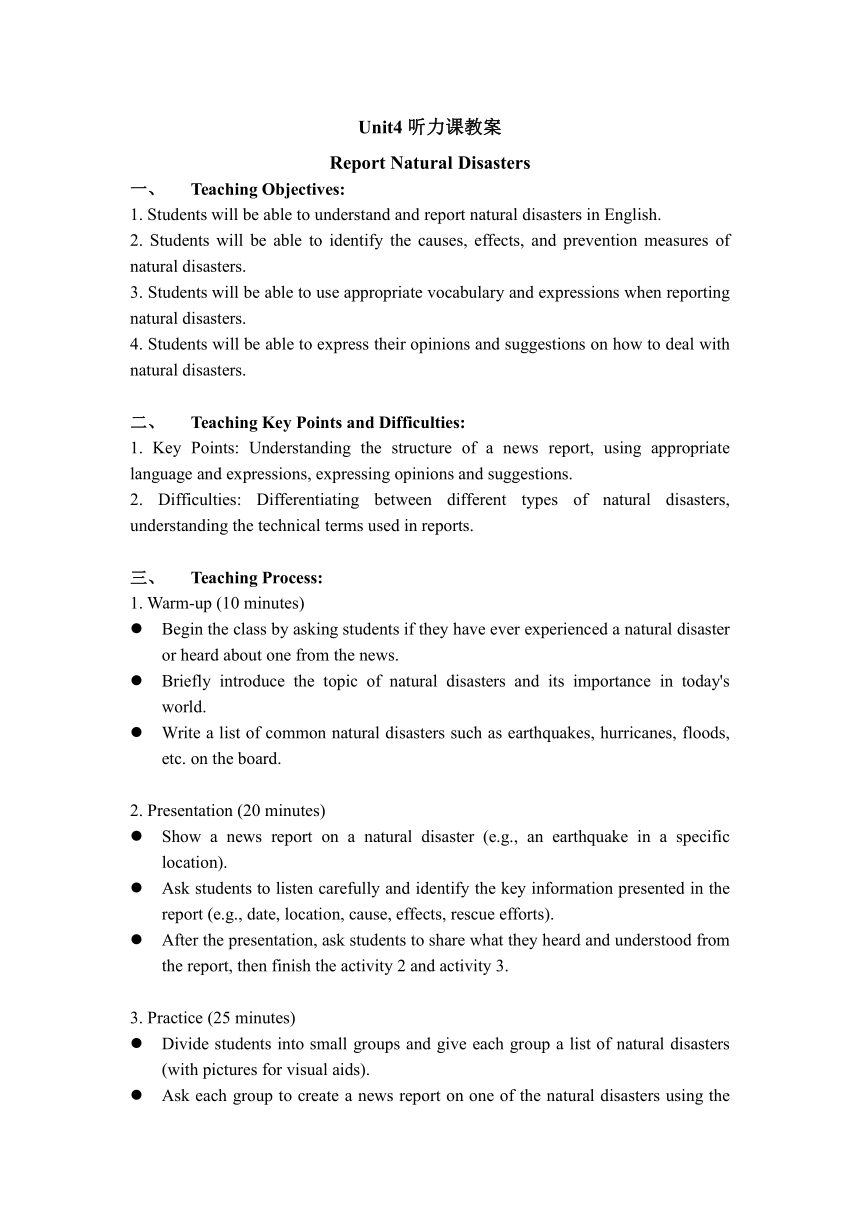人教版(2019)必修第一册Unit 4 Natural disasters Listening and Speaking 教案-
文档属性
| 名称 | 人教版(2019)必修第一册Unit 4 Natural disasters Listening and Speaking 教案- |

|
|
| 格式 | docx | ||
| 文件大小 | 18.3KB | ||
| 资源类型 | 教案 | ||
| 版本资源 | 人教版(2019) | ||
| 科目 | 英语 | ||
| 更新时间 | 2023-10-17 07:00:20 | ||
图片预览

文档简介
Unit4听力课教案
Report Natural Disasters
Teaching Objectives:
1. Students will be able to understand and report natural disasters in English.
2. Students will be able to identify the causes, effects, and prevention measures of natural disasters.
3. Students will be able to use appropriate vocabulary and expressions when reporting natural disasters.
4. Students will be able to express their opinions and suggestions on how to deal with natural disasters.
Teaching Key Points and Difficulties:
1. Key Points: Understanding the structure of a news report, using appropriate language and expressions, expressing opinions and suggestions.
2. Difficulties: Differentiating between different types of natural disasters, understanding the technical terms used in reports.
Teaching Process:
1. Warm-up (10 minutes)
Begin the class by asking students if they have ever experienced a natural disaster or heard about one from the news.
Briefly introduce the topic of natural disasters and its importance in today's world.
Write a list of common natural disasters such as earthquakes, hurricanes, floods, etc. on the board.
2. Presentation (20 minutes)
Show a news report on a natural disaster (e.g., an earthquake in a specific location).
Ask students to listen carefully and identify the key information presented in the report (e.g., date, location, cause, effects, rescue efforts).
After the presentation, ask students to share what they heard and understood from the report, then finish the activity 2 and activity 3.
3. Practice (25 minutes)
Divide students into small groups and give each group a list of natural disasters (with pictures for visual aids).
Ask each group to create a news report on one of the natural disasters using the information provided by their group members.
Encourage students to use appropriate vocabulary and expressions when reporting the natural disasters.
After 10 minutes, have each group present their report to the class.
Facilitate a discussion on the different types of natural disasters and their impacts.
4. Production (10 minutes)
Ask students to write a short paragraph (about 3 sentences) on how they would prepare for a natural disaster in their community or hometown.
Encourage them to use appropriate vocabulary and expressions related to natural disasters.
Have students exchange their paragraphs with a partner and provide feedback on each other's writing.
5. Consolidation (5 minutes)
Review the key points of reporting natural disasters in English (e.g., identifying the cause, effect, prevention measures).
Ask students to share any difficulties they encountered during the lesson and suggest ways to overcome them.
Homework:
1. Write a short essay on the importance of being prepared for natural disasters and how individuals can contribute to preventing them. Use appropriate vocabulary and expressions related to natural disasters.
2. Watch a news report on a natural disaster and write a brief summary of what you learned from the report (about 50 words).
Report Natural Disasters
Teaching Objectives:
1. Students will be able to understand and report natural disasters in English.
2. Students will be able to identify the causes, effects, and prevention measures of natural disasters.
3. Students will be able to use appropriate vocabulary and expressions when reporting natural disasters.
4. Students will be able to express their opinions and suggestions on how to deal with natural disasters.
Teaching Key Points and Difficulties:
1. Key Points: Understanding the structure of a news report, using appropriate language and expressions, expressing opinions and suggestions.
2. Difficulties: Differentiating between different types of natural disasters, understanding the technical terms used in reports.
Teaching Process:
1. Warm-up (10 minutes)
Begin the class by asking students if they have ever experienced a natural disaster or heard about one from the news.
Briefly introduce the topic of natural disasters and its importance in today's world.
Write a list of common natural disasters such as earthquakes, hurricanes, floods, etc. on the board.
2. Presentation (20 minutes)
Show a news report on a natural disaster (e.g., an earthquake in a specific location).
Ask students to listen carefully and identify the key information presented in the report (e.g., date, location, cause, effects, rescue efforts).
After the presentation, ask students to share what they heard and understood from the report, then finish the activity 2 and activity 3.
3. Practice (25 minutes)
Divide students into small groups and give each group a list of natural disasters (with pictures for visual aids).
Ask each group to create a news report on one of the natural disasters using the information provided by their group members.
Encourage students to use appropriate vocabulary and expressions when reporting the natural disasters.
After 10 minutes, have each group present their report to the class.
Facilitate a discussion on the different types of natural disasters and their impacts.
4. Production (10 minutes)
Ask students to write a short paragraph (about 3 sentences) on how they would prepare for a natural disaster in their community or hometown.
Encourage them to use appropriate vocabulary and expressions related to natural disasters.
Have students exchange their paragraphs with a partner and provide feedback on each other's writing.
5. Consolidation (5 minutes)
Review the key points of reporting natural disasters in English (e.g., identifying the cause, effect, prevention measures).
Ask students to share any difficulties they encountered during the lesson and suggest ways to overcome them.
Homework:
1. Write a short essay on the importance of being prepared for natural disasters and how individuals can contribute to preventing them. Use appropriate vocabulary and expressions related to natural disasters.
2. Watch a news report on a natural disaster and write a brief summary of what you learned from the report (about 50 words).
